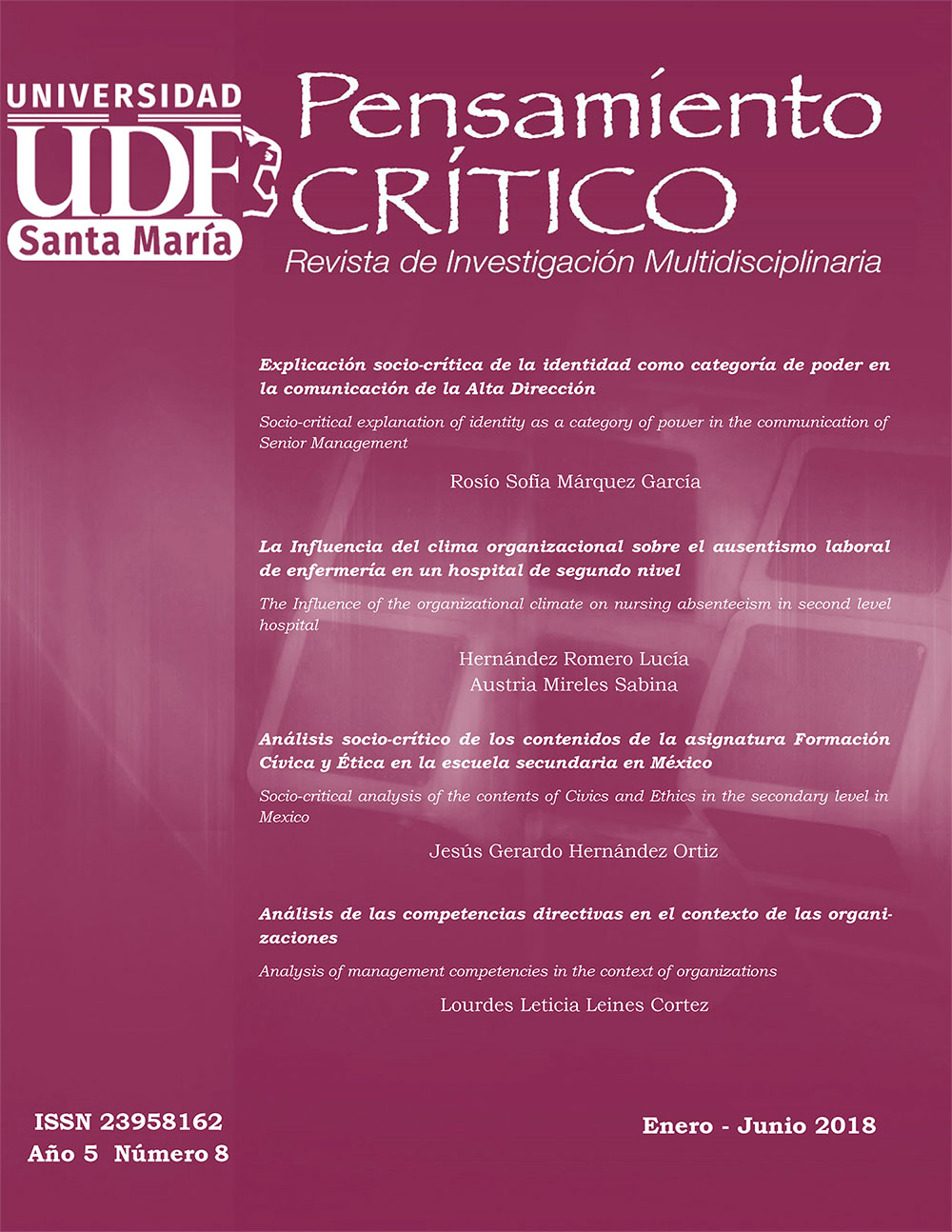Abstract
The objective of this work is to analyze management competencies in the context of organizations from a systemic approach. The organization is a complex system because each of the different functional areas weave a set of connections which characteristic is complexity. The analysis of competencies in the context of organizations seeks to gather the conceptual and theoretical foundations that frame it, specifying in a way the management competencies, but without detracting from the competencies that are generally required in organizations. The use of the term competency is analyzed, as well as the most relevant classifications that have emerged in the last decades; The origin of the term competency from different angles and the need to vindicate the importance of its implementation, without detracting from the knowledge and skills that the members of an organization have but perceiving the attributes in an integral way to understand the development of management competencies.
References
Alles, M. (2008). Dirección estratégica de recursos humanos gestión por competencias, casos. Argentina: Ediciones Granica.
Attewell, P. (2009). ¿Qué es una competencia? Pedagogía Social. Revista Interuniversitaria, 16, 21-43.
Bertalanffy, L. V. (1976). Teoría General de los sistemas: fundamentos, desarrollo, aplicaciones. México: Fondo de Cultura Económica.
Boyatzis, R. (1982). The competent manager: A model for effective performance. Nueva York: Johm Wiley & Sons.
Boyatzis, R. (2002). El desarrollo de competencias sin valores es como el sexo sin amor. Revista de Psicología del Trabajo y de las Organizaciones, 18, 247-258.
Brunet, I. & Enguita, M. (2003). Flexibilidad y formación: una crítica sociológica al discurso de las competencias. Barcelona: Icaria
Bunk, G. (1994).Teaching Competence in Initial and Continuing Vocational Training in the Federal Republic of Germany. Vocational Training European Journal, 1, 8-14.
Díaz, J. & Márquez, J; (2007). Formación por competencias para los programas directores. Investigación y Postgrado, 22, 239-260.
Entrepreneur (2014). 3 competencias del directivo. Consultado en: https://www.entrepreneur.com/article/266873
Escobar, M. (2005). Las competencias laborales: ¿La estrategia laboral para la competitividad de las organizaciones? Estudios Gerenciales, 96, 31-55.
González, C. (2015). El quehacer del director: reflexiones sobre la dirección estratégica de organizaciones. México: Océano.
Izaguirre, R., Ramírez, H., Pérez, P., Estrada, E., Brizuela, E., & Pérez, E. (2009). Las competencias directivas: Una necesidad para el perfeccionamiento de la dirección en salud. Revista de Información Científica para la Dirección en Salud. 0(8), 1-20.
Jiménez, D. (2007). Manual de recursos humanos. España: esic.
López, B. (2007). Administración de servicios de alimentación: calidad, nutrición, productividad y beneficios. Medellín: Universidad de Antioquia.
McBer, H. (2000). Research into Teacher Effectiveness. A Model of Teacher Effectiveness. Disponible en: http://ateneu.xtec.cat/wikiform/wikiexport/_media/formgest/.pdf
McClelland, D. C. (1973). Testing for competence rather than intelligence. American Psychologist, 28(1), 1-14.
Martínez, L. & Puga, J. (2008). Competencias directivas en escenarios globales. Estudios Gerenciales, 24, 87-103.
Olivares, A. M. (2007). Competencias para un mundo cognoscente. Revista Interuniversitaria de Formación del Profesorado, 21, 137-148.
Pereda, S. & Berrocal, F. (1999) Gestión de Recursos Humanos por Competencias. España: Editorial Centro de Estudios Ramón Areces, S.A.
Restrepo de O, L. S., Ladino, A. M. & Orozco, D. C. (2008). Modelo de reclutamiento y selección de talento humano por competencias para niveles directivo de la organización. Scientia Et Technica, 39, 286-291.
Robbins, S. & Coulter, M. (2014). Administración. México: Pearson Prentice Hall.
Rodríguez, F., Alcover, C. & Rodríguez, F. (1998). Formación de competencias directivas. Revista de Psicología Social, 13 (2), 189-193.
Spencer, L. M. & Spencer, S. M. (1993). Competence at work: Models for superior performance. New York: Wiley.
Stein, G. (1999). El arte de gobernar según Peter Drucker. España: Gestión 2000.
Tobar, E. (2010). Competencias gerenciales: habilidades, conocimientos, aptitudes. Bogotá: Ecoe Ediciones.
Torres, Z. (2013). Teoría general de la administración. México: Grupo Editorial Patria.
Vadillo, M. (2008). El perfil competencial del puesto de director/a de marketing en organizaciones de la Comunidad de Madrid. Madrid: ESIC.

This work is licensed under a Creative Commons Attribution-NonCommercial-NoDerivatives 4.0 International License.
Copyright (c) 2025 Pensamiento Crítico. Revista de Investigación Multidisciplinaria

